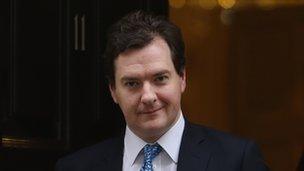UK public sector borrowing rises slightly in December
- Published

The loss of the UK's AAA rating would be seen as an embarrassment for George Osborne
The government borrowed slightly more than expected in December, fuelling fears that the UK could lose its coveted AAA credit rating.
UK public sector net borrowing, excluding financial interventions, hit £15.4bn in December, the Office for National Statistics (ONS) said.
That marked a small rise from the £14.8bn borrowed in December 2011.
The headline figure was slightly worse than expected - analysts had forecast borrowing of £15.2bn.
December's figure takes total borrowing so far this financial year, excluding a transfer of Royal Mail pension assets, to £106.5bn, some £7.2bn more than for the same period in 2011.
Investec economist Philip Shaw said he still expected the deficit to overshoot the Office for Budget Responsibility's forecasts from the Autumn Statement last year.
"There are no signs of progress in the public finances," he added.
A Treasury spokesman insisted that the economy was healing and said that the figures indicated a gradual recovery.
But Labour's shadow chief secretary to the Treasury, Rachel Reeves, said the government's economic plan was "hurting but not working".
The pound fell against the euro immediately after the data was released - trading 0.2% lower at 1.1872 euros.
Negative outlook
The data showed that government receipts rose 3.6%, while spending grew 5.4% in December compared with a year ago.
The broader public sector net borrowing measure - which includes the cost of bailing out the UK's banks - rose to £13.2bn in December from £12.6bn a year ago.
The UK's total public sector net debt, excluding the cost of bank support, is now £1.11 trillion, or 70.7% of GDP.
All three of the major credit ratings agencies now have the UK's AAA rating on negative outlook, meaning they could downgrade its rating if performance deteriorates.
In his Autumn Statement in December, Chancellor George Osborne acknowledged public finances were taking longer to rectify than planned, and admitted he would be forced to extend austerity measures by at least another year.
David Kern, chief economist at the British Chambers of Commerce (BCC), said December's figures reinforced the case for Mr Osborne to stick to his deficit cutting plan.
"To maintain confidence, he must persevere with real cuts in current spending and continue to prioritise capital investment," he added.
The news on public sector finances comes days before economic growth (GDP) figures are expected to show the economy contracted in the final three months of 2012.